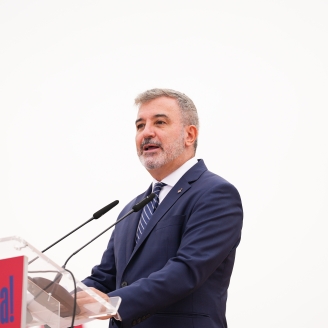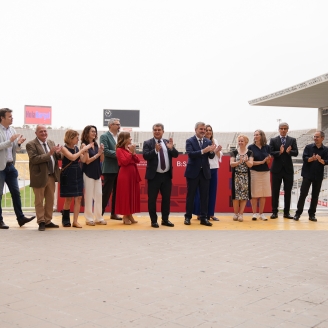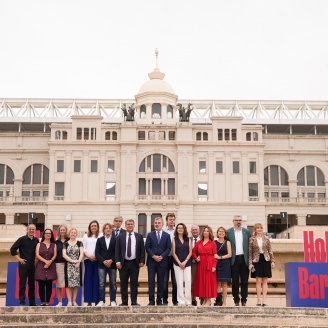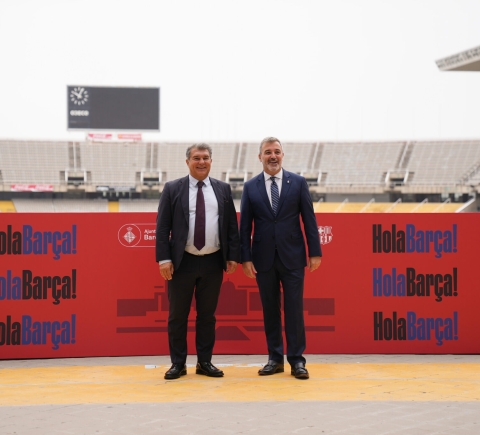
The Lluís Companys Olympic Stadium will be home to FC Barcelona for the 2023-24 season

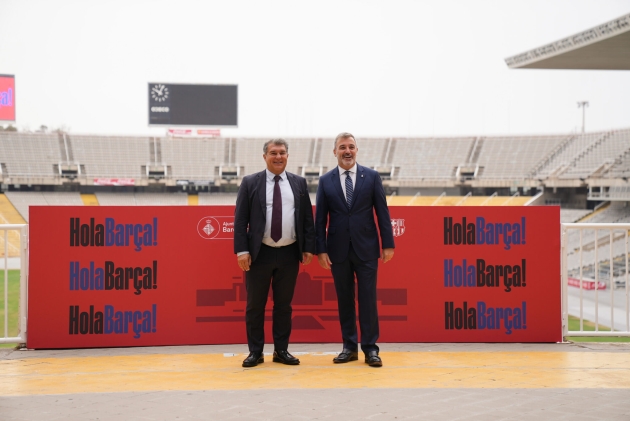
The first team will move to Montjuïc while part of the construction work on Espai Barça is carried out
The City Council and FC Barcelona have developed a mobility plan to boost public transport and sustainable mobility, while also increasing maintenance and security services
The arrangement will be compatible with other events held in the Olympic Ring and Montjuïc mountain
FC Barcelona's first team will play in the Lluís Companys Olympic Stadium during the 2023-24 season. Barcelona City Council, Barcelona de Serveis Municipals (B:SM), the facility manager and FC Barcelona have signed an agreement that will allow the club to use the Olympic facilities while most of the renovation work on Camp Nou is carried out.
This morning, Jaume Collboni, the first Deputy Mayor and president of B:SM, and Joan Laporta, president of FC Barcelona, explained the terms of the agreement.
FC Barcelona will be able to use the stadium from August 2023 to May 2024. The lease agreement will be for the men's first team match days and the preparations before and after those days. FC Barcelona may also use the stadium on other specific occasions, for training and other sporting events, including those that the women’s team may need.
FC Barcelona will adapt the facility to its technical needs
In addition to the playing field and stands, the lease agreement includes other spaces, such as the press stand, the changing rooms and indoor car parks, among others.
The Club's technical services are now assessing what adaptations will need to be made to the facilities in order to satisfy the needs of the various sporting competitions the first team takes part in. These investments will be paid for by the club.
During the leasing period, Barça will have a guaranteed crowd capacity of nearly 55,000 people.
Barça will be coexisting with all the other Olympic Ring events and the vibrancy of Montjuïc mountain
The City Council, B:SM and FC Barcelona have ensured that the Club's activities will be compatible with all the other cultural, sporting and civic uses of the Olympic Ring and the other facilities on Montjuïc mountain. In all cases, it will be taken into account that the matches should not coincide or interfere with any other event scheduled for Palau Sant Jordi or the Olympic Esplanade.
Improvement work in the area around the mountain and stepping up the various municipal services
In order to ensure that the general public has good access to the Olympic Stadium, Barcelona City Council and FC Barcelona have produced a mobility plan that reinforces public transport and sustainable mobility, as well as putting in place extraordinary maintenance and security services to ensure that there is as little impact as possible on the mountain. The cost associated with these services is €7.2 million, 64% of which will be paid by Barça and 36% by the City Council. The municipal contribution will be for investments that will remain permanently on the mountain. The funicular railway services will be improved, there will be shuttle buses to the Olympic Stadium from the main public transport access points (Plaça Espanya, L9 and Estació de Sants) and the members of the various supporters’ clubs will be encouraged to arrive by coach. Where necessary, due to the time of the match, it is also planned to extend the opening hours of the metro service.
The cost of extending public transport services will be borne by the Club, along with the cost of the extraordinary maintenance and security services.
In order to foster sustainable mobility on the mountain, there will also be a bicycle lane between Plaça Espanya and Miramar, 3 Bicing stations and parking spaces for bicycles.
Where needed, street lighting will be improved for match times along the main walking routes and pedestrian paths will be stabilised between public transport points and the stadium.
The Olympic Ring: emblematic venues at the service of culture, sport and the city's international positioning
Thirty years after the Barcelona ‘92 Games, the Olympic Ring remains an active place that positions the city internationally as a location of major cultural, sporting and leisure events. Furthermore, the Lluís Companys Stadium, the Olympic Esplanade and Palau Sant Jordi host a wide range of activities for the general public, especially families, thereby maintaining the connection between Barcelona residents and these emblematic venues.
Once again, the agreement with FC Barcelona exemplifies the role that the Olympic Ring plays as a generator of Barcelona’s economic, sporting and cultural activity, and Barcelona's commitment to respond to the needs of major institutions that help to promote the city and its values.

